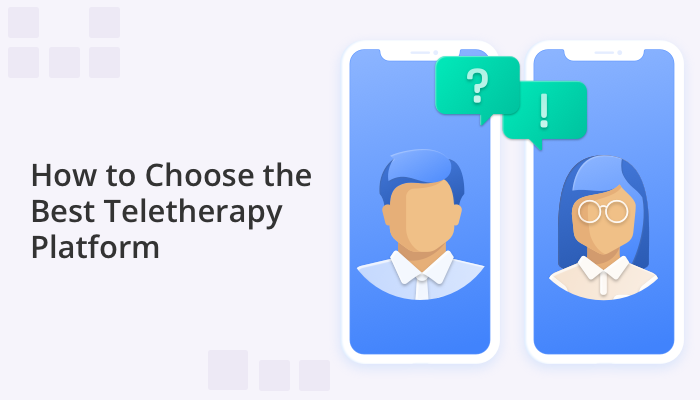
This article has been updated since it was last published in 2020
For psychotherapists and counselors offering mental health support, chances are they are offering services online. The move to teletherapy has been under way for a while, but received a major impetus by the COVID-19 pandemic. Amidst the anxiety and stress generated by the healthcare crisis, teletherapy video platforms served an invaluable function offering much needed support for people struggling with social isolation. Even though the lockdown period has now thankfully passed, many healthcare professionals, having discovered the benefits of offering online therapy, continue to use this tool to see clients.
But if you are a psychotherapist or counselor, how do you choose the best teletherapy platform? Read on to learn about the essential features required to offer a safe and comprehensive online therapy experience.
Learn more about: The Best Teletherapy Apps of 2022
What is a Teletherapy Platform?
Teletherapy provides online counseling and mental health therapy sessions using telephonic conversation or video calling interfaces. It’s a virtual setup to connect clients with mental health professionals, providing effective therapy services minus the clutter involved with in-person visits.
Usually teletherapy begins with a patient selecting a therapist from a teletherapy service provider, completing an online assessment, and scheduling a session. The actual therapy, which typically occurs on a weekly basis, is conducted via video or audio calls.
At a minimum, teletherapy platforms offer in-app chat and video-calling functionality, but more sophisticated platforms offer a host of additional features including file sharing, billing, and scheduling capabilities.
Teletherapy video platforms offer individuals the comfort and convenience of receiving mental health support from their home, and statistics show that it is relatively effective. In a recent survey, nearly 63% of teletherapy users in the US reported that they had benefited from virtual therapy.
How to choose a teletherapy platform
If you’re a healthcare provider intending to offer therapy or counseling online, here are some factors you need to consider when choosing which online therapy solution to use.
HIPAA Compliant
If you practice in the United States, perhaps the most important consideration is whether the platform complies with HIPAA, The Health Insurance Portability and Accountability Act (1996). This federal law protects sensitive patient health information from being disclosed. It requires healthcare providers, or other organizations that deal with patient data, to follow a stringent set of security measures to ensure Protected Health Information (PHI) is safeguarded. Failure to do so can result in hefty fines.
Relying on regular video chat software like Zoom, Skype, or FaceTime to conduct therapy sessions, just won’t cut it. Therapists must ensure they use teletherapy software that meets HIPAA privacy and security rules. Furthermore, patients prefer HIPAA-compliant teletherapy platforms since they qualify for medical insurance coverage.
Learn more about: Is Zoom for Healthcare HIPAA compliant?
Video Calling and Instant Messaging
Therapists are recommended to choose a platform that offers both high-quality video and audio calling, and in-app messaging. Relying just on audio calls to conduct therapy has limitations. Visual video communication enables face-to-face interactions fostering trust and connection. Picking up on visual clues about their client’s facial expression, level of eye contact, and general body postures provides a wealth of useful information for the therapist. It is also helpful to sometimes exchange text-based messages, for example, to notify each other if one is running late for a session or needs to change the date or time. By providing in-app chat capabilities, the teletherapy platform deters clients from contacting therapists on other non-HIPAA compliant 3rd party apps. All communications are kept safely within the teletherapy platform.
Video-Recording
With some teletherapy solutions, the practitioner is able to record and save the video session. This can be a helpful feature, especially for therapists still receiving training or supervision.
Screen-sharing
Screen-sharing enables enhanced collaboration between the client and therapist, thus ensuring in-depth remote consultation. This feature allows the viewing of questionnaires, worksheets, flashcards, slides, or photos used in the therapy.
Appointment Scheduling
Choosing a secure teletherapy platform with a scheduling module is a great option. This feature allows the client the convenience of scheduling a virtual therapy session on the therapist’s calendar. Conversely, a therapist can schedule the session and send out an invite from within the app as well. Not only does this lessen the likelihood of missed appointments, but also means that the platform maintains an accurate and up-to-date record of a client’s appointment history. This record is helpful for billing and invoicing purposes.
Data Gathering Forms
This feature enables therapists to gather data from their clients before or after a session. For example, it may be part of the therapist’s practice to assess the progress of their client’s mental health over several weeks via on-line questionnaires, or they may wish to use online forms during the initial appointment to gather client data. Providing this facility within the teletherapy app creates greater ease and efficiency and means all client data is securely stored.
Reminders and Push notifications
While by no means an essential feature, the ability for the teletherapy platform to send reminders via push notifications of up-coming appointments significantly lessens the likelihood of missed appointments.
Billing and Invoicing
You may want to choose teletherapy software that includes an in-app billing mechanism, or the possibility to easily integrate with medical billing software platforms. Again, this means greater ease and convenience and is a feature that allows payments to be made effortless and on time.
Learn more about: QuickBlox Chat API to Provide Mental Health Support for Teens in Need
Building a Teletherapy Platform with QuickBlox
If you are interested in building your own teletherapy platform that is custom-made to suit your specific use case needs, talk to us at QuickBlox. QuickBlox HIPAA compliant telemedicine solutions provides a comprehensive software tool kit for everything you might need including chat, video & audio calling, push notifications and file sharing available via SDKs and APs.
We also offer our own ready solution, Q-Consultation to provide secure teletherapy support.







Great Content! Totally agree that Telemedicine apps are highly beneficial for patients. Thanks for sharing useful content.